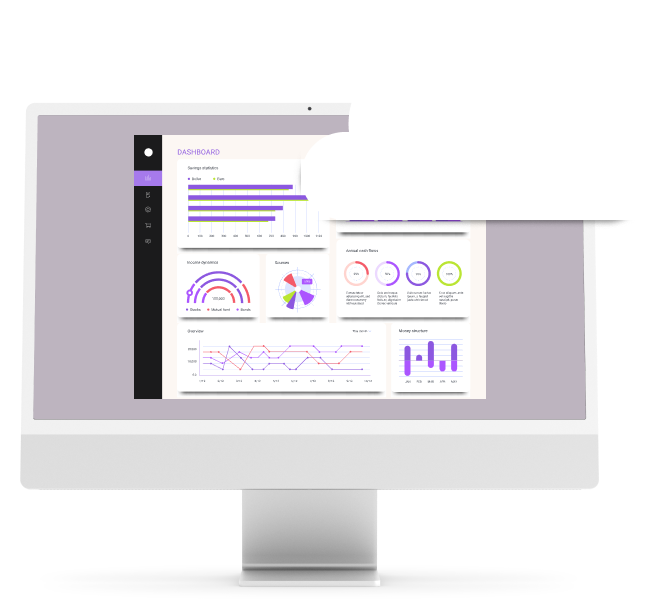Introduction to Cloud Services
Unlock the Power of the Cloud
Cloud services have become the backbone of modern technology, enabling businesses and individuals to access computing resources over the internet. Instead of relying on physical hardware and local storage, cloud computing provides on-demand access to servers, storage, databases, and software, making it easier to scale, collaborate, and innovate. From everyday applications like email and file storage to advanced artificial intelligence and big data processing, cloud services offer flexibility, security, and cost-efficiency. From startup to enterprise, leveraging cloud services is key to staying competitive.
Let’s talk cloud

A full suite of cloud services for your organization

Cloud Hosting
Cloud hosting is built on the foundation of AWS’s robust infrastructure, renowned for its reliability, security, and extensive feature set. From elastic computing resources that grow with your demand to serverless architectures that enable you to pay only for what you use.
Cloud Strategy
By carefully evaluating your business needs, you can harness the full potential of cloud-based solutions, ensuring that your technology investments deliver maximum value and support your long-term objectives.
Cloud Migration
The process of moving data, applications, and IT infrastructure from on-premises servers to a cloud provider’s servers, offering benefits like cost reduction, improved performance, and increased flexibility.
Security & Compliance
As part of our Cloud Managed Services, we follow best practices such as using AWS’s managed services to ensure reliability, setting up security measures and identity management with AWS IAM, and planning for growth with Amazon EC2 and AWS Lambda. This ensures that the cloud solutions are not only strong and adaptable but also grow alongside your needs without compromising on security or reliability
DevOps & Automation
Using tools and processes to automate repetitive and manual tasks in software development and IT operations, aiming to improve efficiency, reliability, and speed throughout the software development lifecycle.
Monitoring & Maintenance
We offer extensive monitoring of system performance ensuring your infrastructure is always running smoothly. Our backup and disaster recovery protocols are robust, covering everything from data protection to version control. Regular updates and optimizations keep your systems secure and efficient, while our pricing and scaling strategies ensure you get the most value from your cloud investment.
Cost Management/ Cost Audit
Our team of cloud engineers is highly trained, holding Professional AWS certifications. This means they have the most up-to-date knowledge and skills to use AWS technology in the best way possible. With these certifications, we assure you’re getting the very best cloud solutions, designed to be fast, secure, and cost-effective. This level of expertise meets the high expectations needed to stand out in today’s fast-paced digital world.
Infrastructure Management
When we started hosting applications and websites, the cloud didn’t exist. From the early days of VMware and virtualization to the modern cloud, we’ve always been ahead of the curve. Today, our experience is vital in helping customers modernize and scale their hosting with the cloud.
Why Choose Atlantic BT for Cloud Services?
Atlantic BT is a trusted partner for organizations seeking to optimize their cloud infrastructure, whether migrating to the cloud, modernizing applications, or ensuring top-tier security and compliance. Here’s why we should be your go-to cloud services provider:

Expert Cloud Strategy & Migration
Atlantic BT specializes in seamless cloud migrations, ensuring minimal disruption to your operations. Whether you’re transitioning from on-premises infrastructure or moving between cloud providers, their team develops tailored strategies to optimize performance and cost. We understand applications to the code level. We don’t just migrate applications as a monolith, we understand how they are built and can migrate the most complex environments.
Custom Cloud Solutions
Not all cloud solutions fit every business. Atlantic BT takes a customized approach, aligning cloud services with your organization’s specific needs. From hybrid cloud architectures to fully managed cloud environments, they design solutions that drive business success.
Security & Compliance First
With an increasing number of cyber threats, security is paramount. Atlantic BT implements best-in-class security protocols, ensuring compliance with industry standards like HIPAA, SOC 2, and GDPR. They provide continuous monitoring, threat detection, and data protection to safeguard your cloud environment.
Cost Optimization & Performance Efficiency
Managing cloud costs can be complex, but Atlantic BT helps optimize your cloud spend while maximizing performance. We leverage automation, AI-driven monitoring, and cloud-native technologies to ensure your cloud environment is cost-effective and high-performing.
Reliable Managed Cloud Services
For organizations looking for ongoing cloud support, we provide fully managed services, including 24/7 monitoring, proactive maintenance, and performance optimization. Their team acts as an extension of your IT department, ensuring uptime and efficiency.
Industry Expertise & Proven Track Record
We work with leading enterprises, government agencies, and healthcare providers, helping them navigate complex cloud transformations. Their industry expertise ensures that your cloud strategy aligns with the latest best practices and technologies.
Innovation-Driven Approach
With a focus on cutting-edge cloud technologies, Atlantic BT helps businesses stay ahead of the curve. Whether integrating AI, serverless computing, or Kubernetes, they deliver future-ready cloud solutions that enable agility and growth.
Insights on Cloud Services
Frequently Asked Questions
Questions & Answers
What are the three main cloud computing service models?
The three main cloud computing service models are Infrastructure as a Service (IaaS), Platform as a Service (PaaS), and Software as a Service (SaaS). IaaS provides virtualized computing resources like servers and storage. PaaS offers a platform for developers to build and deploy applications without managing infrastructure. SaaS delivers software applications over the internet, eliminating the need for local installations.
What are Amazon cloud services?
Amazon Web Services (AWS) is a comprehensive cloud platform offering a wide range of services, including computing (EC2), storage (S3), databases (RDS, DynamoDB), networking, AI/ML, security, and analytics. AWS provides scalable and on-demand cloud solutions for businesses, developers, and enterprises.
How do cloud services work?
Cloud services operate by delivering computing resources over the internet. Providers host infrastructure, platforms, and applications in data centers, allowing users to access and use these services remotely. Cloud computing enables scalability, cost savings, and flexibility, as users pay only for what they use without needing to maintain physical hardware.
What is cloud infrastructure as a service?
Infrastructure as a Service (IaaS) is a cloud model that provides virtualized computing resources like virtual machines, storage, and networking on demand. It allows businesses to run applications and workloads without investing in physical infrastructure, making it a cost-effective and scalable option for IT operations.
What are cloud computing services?
Cloud computing services include computing power, storage, networking, databases, machine learning, analytics, security, and more, delivered over the internet. These services fall into categories such as IaaS (e.g., AWS EC2), PaaS (e.g., Google App Engine), and SaaS (e.g., Microsoft 365), providing flexible and efficient solutions for businesses and individuals.
What are the risks of using a cloud service provider?
Risks of using cloud service providers include data security and privacy concerns, service outages, vendor lock-in, compliance challenges, and potential cost overruns. Businesses must assess providers for reliability, data protection policies, and legal compliance to mitigate these risks effectively.




